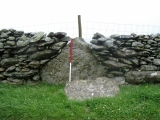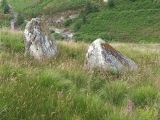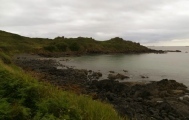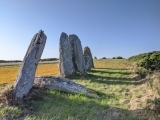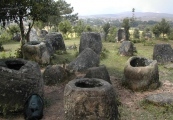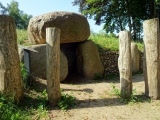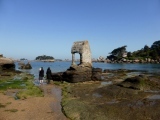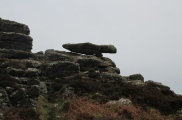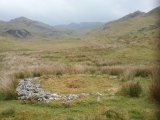Andy Burnham's Blog, page 191
July 29, 2020
Rough Hill Tarn Stone Row/Alignment
Possible remains of a stone row or prehistoric field system seen in the boundary field wall alongside the road next to Rough Hill Tarn, Heltondale Common. Several orthostatic triangular shaped boulders up to 1m high, 1m wide and 0.3m thick are visible at intervals in the field wall stretching 160m alongside the road. The drystone wall is built onto and around these stones (but often not on top) suggesting the modern wall post-dates the orthostats.
Published on July 29, 2020 06:43
Nant Llwyd Standing Stones
Two white Bronze Age Standing Stones, the bigger about 6' x 4', standing about 4' apart. Situated in the field below the track from Soar y Mynydd Chapel to Nant Llwyd Farm and above the little Camddwr River that feeds into the Llyn Brianne Reservoir.
Published on July 29, 2020 05:46
Chynhalls Point Fort
Chynhalls Point Univallate cliff castle Fort has Two banks with an intermediate ditch, across a headland promontory, near Coverack in Cornwall. The area of the fort is approximately 1 1/2 hectares. The outer rampart which peters out in the south, is up to 1.0m high, and the inner rampart which is stone revetted, is up to 2.6m high.
Published on July 29, 2020 05:46
July 26, 2020
Vieux-Moulin Alignement
This is a nice little row of 6 menhirs, up to 4 metres in height, standing on the slopes of a field just near to the busy D.781 Carnac to Erdeven road, just to the north of Plouharnel station. These are nicely shaped and positioned stones. It is not known whether the line ofmenhirs standing today were once part of a set of alignements, or the remains of a giant cromlech.
Published on July 26, 2020 06:36
July 24, 2020
The Plain of Jars
New research into the megalithic structures on the Plain of Jars in Laos. Radiocarbon dates and evidence some of these 30 tonne structures were brought from a quarry 8km away. More in the comments on our page.. The Plain of Jars is famous for its huge stone vessels, ranging in height from 1.5 to three metres tall, These remarkable stone receptacles can occur individually, or in groups running to several hundred. While the most-famous set was arranged on the plain (hence the name), most jars can be found perched on ridges and hills, with some still shrouded by forest. All the signs are that these vessels were associated with funerary activity, but the communities responsible for them remain mysterious.
Published on July 24, 2020 10:09
July 21, 2020
Grosssteingrab Aurich-Tannenhausen
A nearly destroyed chambered tomb in Lower Saxony, of which two capstones and one upright are visible. The tomb consisted of two chambers, the eastern chamber is gone. A beautiful place. In 2014 the city of Aurich added a reconstruction of the eastern chamber (pictured), with five heavy boulders imported from Mecklenburg Vorpommern.
Published on July 21, 2020 13:59
Oratoire de St Guirec
The Oratoire de St Guirec is situated on the beach named after St Guirec, the Welsh monk who landed here on his voyage from Britain in the 6th century, allegedly arriving in a stone trough pulled by angels. The original wooden statue has been replaced by one of stone, after becoming damaged by the local tradition for girls to stick a pin in its nose when they wanted to marry.
Published on July 21, 2020 10:21
July 18, 2020
Book Review: Indonesian Megaliths: A forgotten cultural heritage, Tara Steimer
Georg writes: While doing some internet research on the Lore Lindu megaliths I came across a recent very nice book on megaliths in Indonesia from the Laboratory of Prehistoric Archaeology and Anthropology of the University of Geneva. It has Free Access so you can download it. As a resident of Indonesia I am always on the 'hunt' for information on megalithic sites, this is actually quite a difficult task, since they are either in Indonesian with little background information or research or on obscure websites and in many cases copied from various sources.So this book is a jewel, in an easy to read text covering the history and scale of the megalithic culture all over Indonesia.
Published on July 18, 2020 04:23
Carn Kenidjack propped stone
Possible propped stone found on Carn Kenidjack. It has two points of contact and sits proud on the top of the northern end of this significant natural rocky outcrop. One of the props is quite small in size. It could arguably be natural, but when investigated by a local archaeologist it was noted that the grain on the prop runs in a different direction to the rest of the natural rocky outcrop, leading to the conclusion that it most likely has have been placed here by humans.
Published on July 18, 2020 04:17
July 14, 2020
Bryn Y Castell hut circle
Iron Age hut circle close to Bryn Y Castell Hill fort. Iron was produced at this site with evidence still apparent in the form of slag. See our nearby sites list on this page for the hillfort.
Published on July 14, 2020 12:45

